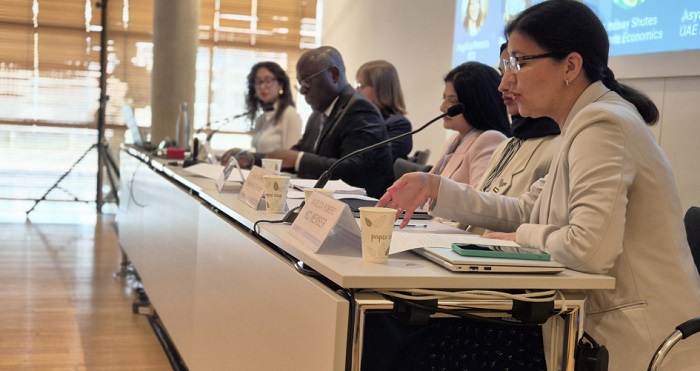How can sophisticated climate modeling tools be made accessible to developing countries to make climate policy assessments more evidence-based, inclusive, and accessible? International experts tackled this question head-on at a UN Climate Change side event on Artificial Intelligence and Technological Advancements for Policy Impact Assessment, held on June 21, 2025, during the UN June Climate Meetings (SB62) in Bonn.

The highlight of the event was the launch of the Climate Policy Impact Assessment General Equilibrium Model (CPIA-GEM) interface, developed by UN Climate Change and the Katowice Committee of Experts (KCI). Angélica Romero, a member of the Katowice Committee of Experts on the Impacts of the Implementation of Response Measures (KCI), officiated the launch.
“This interface has been designed to help make sophisticated modeling tools accessible to more stakeholders by simplifying how users interact with complex economic models,” said Romero.
”I see the wealth of tools that are available for impact assessment, but these tools are often inaccessible, and that’s why the work of the KCI and the UNFCCC to bring this tool into play is just so important,” said Lindsay Shutes, Consultant Economist at Elevate Economics, who took part in developing the interface.
The user-friendly platform allows stakeholders to set custom policy scenarios (such as carbon pricing and emission reduction targets), select geographic scope, upload relevant data, and run simulations to explore impacts on global emissions, growth, and trade. Users can visualize results through intuitive graphs and charts with just a click of the mouse, including scenario comparisons and country-level outcomes. The interface currently features global and country models, with additional country models planned for future release.
The tool addresses a critical gap in climate policy planning, where socioeconomic impact assessments often remain secondary considerations due to capacity constraints. Many countries continue to face challenges in conducting robust policy impact assessments, interpreting findings, and integrating them effectively into policy decisions. Persistent obstacles include limited availability of disaggregated data, insufficient technical modeling capacity, and over-reliance on external consultants.
The interface’s effectiveness was demonstrated during a training session two years ago in the Maldives, where 19 participants with limited technical backgrounds successfully designed and ran their own policy scenarios. Participants were able to identify conflicting national policies – such as taxing diesel imports while subsidizing diesel-based electricity—highlighting the tool’s potential to guide more coherent policymaking.
“In designing interfaces for sophisticated models, the underlying architecture must provide security, scalability, reliability, availability, and performance compliance,” said Pradeep Jain, Principal Technology Architect at Discover, who spoke at the side event.
The UAE added momentum to the initiative by sharing its national AI integration plan, including the open-source Falcon language model, underlining a commitment to sharing innovation globally. Experts also emphasized the importance of ethics, transparency, and emphasized the need for human oversight in AI-assisted policy assessment.
The CPIA-GEM interface aims to bridge capacity gaps and empower governments, analysts, and communities to co-create better informed, more equitable policy decisions. This launch represents part of KCI’s broader effort to build capacity and make impact assessments and economic modeling more accessible to policymakers and stakeholders, aligning with principles of just transition and inclusive climate action.
